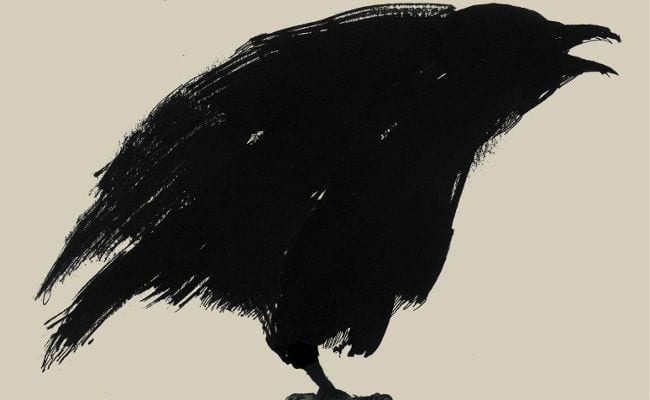Whenever I receive a book recommendation that comes with the claim that it ‘splits the difference between a poem and a novel’, something inside of me groans. I’m not inherently opposed to formal experimentation, but this description tends to be a euphemism for works that are puffed up with self-importance, endlessly pointing to themselves as ‘literary’ and ‘experimental’.
Max Porter’s debut book, Grief Is the Thing with Feathers, is part novel, part poetry collection, and also neither of these things. What I can say for certain is that it’s a fantastic book that tells the story of a father struggling to raise his two boys in the wake of their mother’s death when Crow arrives, offering either absolution or something altogether stranger and darker.
If capital-c Crow sounds like a familiar beast, that’s because he is explicitly the same Crow from Ted Hughes’ Crow: From the Life and Songs of the Crow, though Porter’s incarnation is quite a different beast. Hughes’ mythical vision of some apocalyptic, undying bird is gone and replaced by an altogether more human, more suburban evil that cradles with one hand and chokes with the other. The book is divided into sections titled ‘Dad’, ‘Boys’, and ‘Crow’, and it’s in the various voices of these three characters that Porter’s mix of styles finds its justification.
Porter has an amazing facility with voice. With the father and the boys he captures the tones and topics of middle-class, academically inclined suburbanites, and in Crow he captures its opposite. Porter’s Crow combines jet-black, onomatopoeic verbal drumming, stark crudeness, a sneer directed at the polite Englishness of the central family, and all of these elements are intermixed with great success. The ‘Crow’ sections of the book all deserve to be read aloud, for when given voice they transcend language and become a kind of sound poetry, with the actual meaning of the words becoming secondary to a horrible, mechanistic logic produced by the rhythm of Porter’s writing.
While the voice of Crow is particularly excellent, Porter doesn’t slow down for the ‘Boys’ and ‘Dad’ sections. With the ‘Boys’, Porter captures almost perfectly how children speak; their stories are wild, mythical, playful tales that follow a kind of made-up-as-we-go-along logic, while also occasionally offering — as childish rambling often will — visions of an incomplete home life.
If ‘Boys’ and ‘Crow’ show us a flamboyant Porter, ‘Dad’ is drawn with a directness and realism that punctures much of Porter’s more overtly literary writing. It’s hard to overstate how much variation is packed into this small book, and to give descriptions of the sections as I have done does them something of a disservice, as Porter frequently blurs the boundaries between the sections in a way that makes the book endlessly interesting.
If this doesn’t already sound like Porter has squeezed a great deal into such a slim volume, then consider that Grief also has a lot to say about the status of postmodernism in contemporary literature. Crow often speaks about his position as a character within the book — noting at one point that in other versions of the same story he is ‘a doctor or a ghost’ — and he is of course himself a literary reference (that most common and unapproachable of postmodern games), borrowed from Hughes’ Crow. Dad’s struggle with grief and Crow is also literature’s struggle, and is staged as a question that runs through the book as surely as mourning does: ‘Is grief better depicted as itself, simple and unadorned, or through a high-brow literary reference?’
Rather than providing any simple argument, Porter moves back and forth between a few answers all the way through Grief. Porter stages and develops a recent debate in contemporary fiction with this book, and manages to do so in a way that never feels overbearing, but is undeniably there for reader with an interest in postmodernism and whatever comes after it.
Porter’s range of references is not just limited to Hughes in this book. Familiar lines, ideas, and motifs in literature occur again and again, and become a means by which Porter raises questions about the nature of poetry itself. Poetry quite naturally abounds in the mouths and eyes of Dad and Crow, but it also appears, more surprisingly, in the ‘Boys’ sections of the book. One early section has the boys restaging Auden’s ‘Funeral Blues’ and, just like Hughes’ Crow, it appears changed in this book, and yet unmistakably the same.
Indeed, Porter pokes around in poetry’s carcass and explores its relationship with grief. With the father, poetry gives us a language through which grief can be expressed, but with the uneducated boys we see how poetry might be the natural response to grief, that it might actually be grief itself.
For all of its intertextuality and self-reflexiveness, Grief Is the Thing With Feathers remains a deeply humane book. It takes only an hour or two to read, and yet in this short time it manages to be both poetry and novel, and squeezes in fable, kitchen-sink realism, literary criticism, and stream of consciousness poetry. Porter’s debut is packed with contradiction and stylistic disagreement and yet, like some miraculous water that is somehow at once both turbid and crystal clear, it also manages to be wonderfully, deeply moving over the course of its 128 pages.

